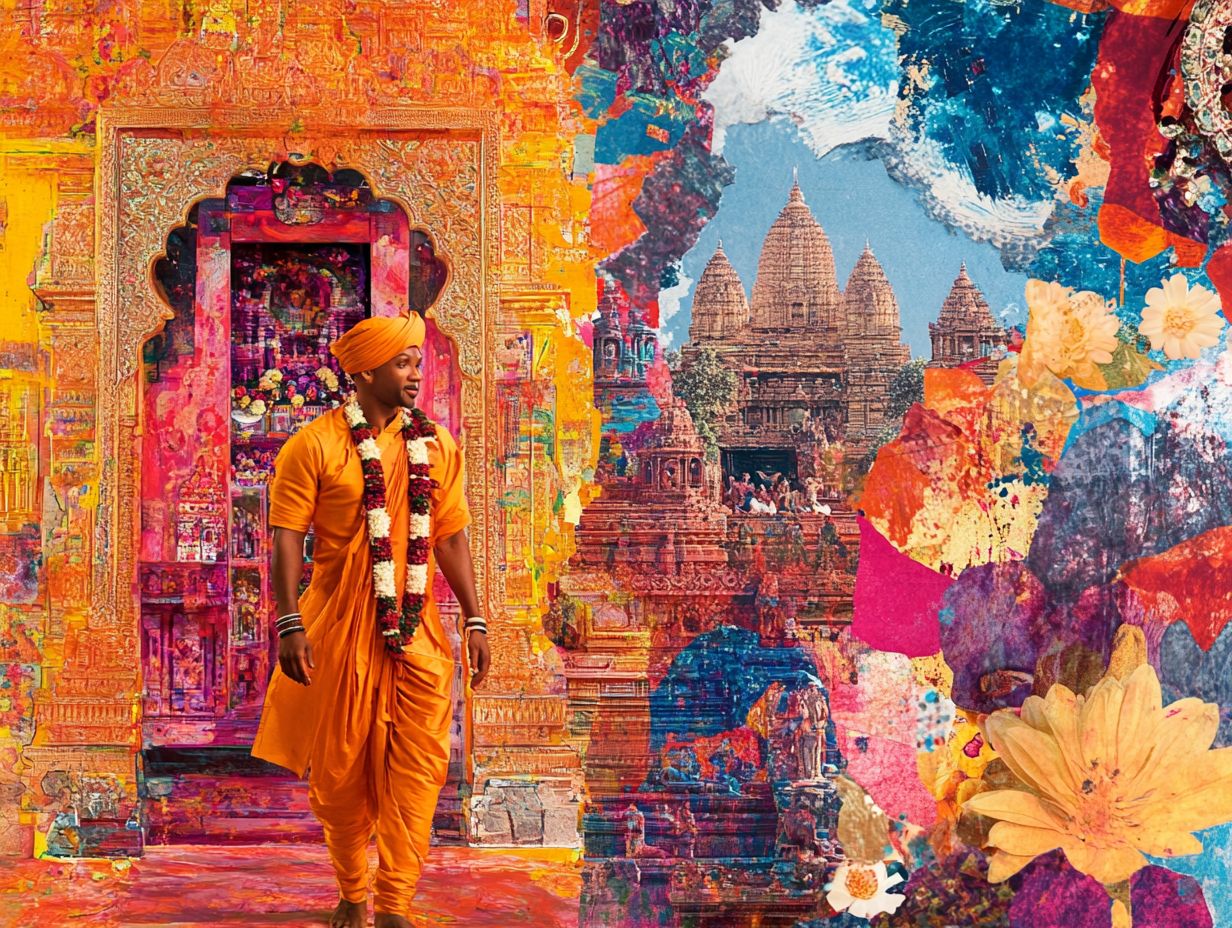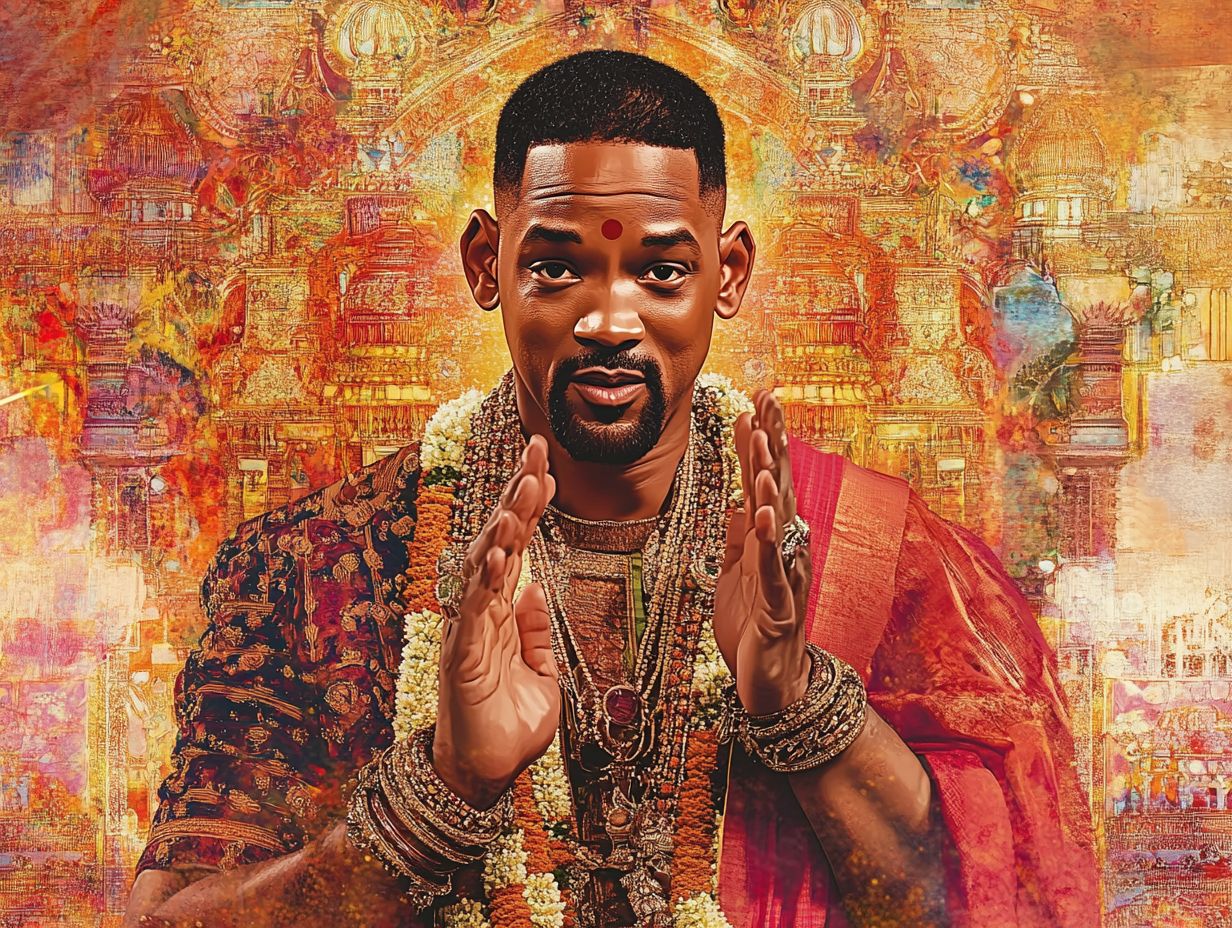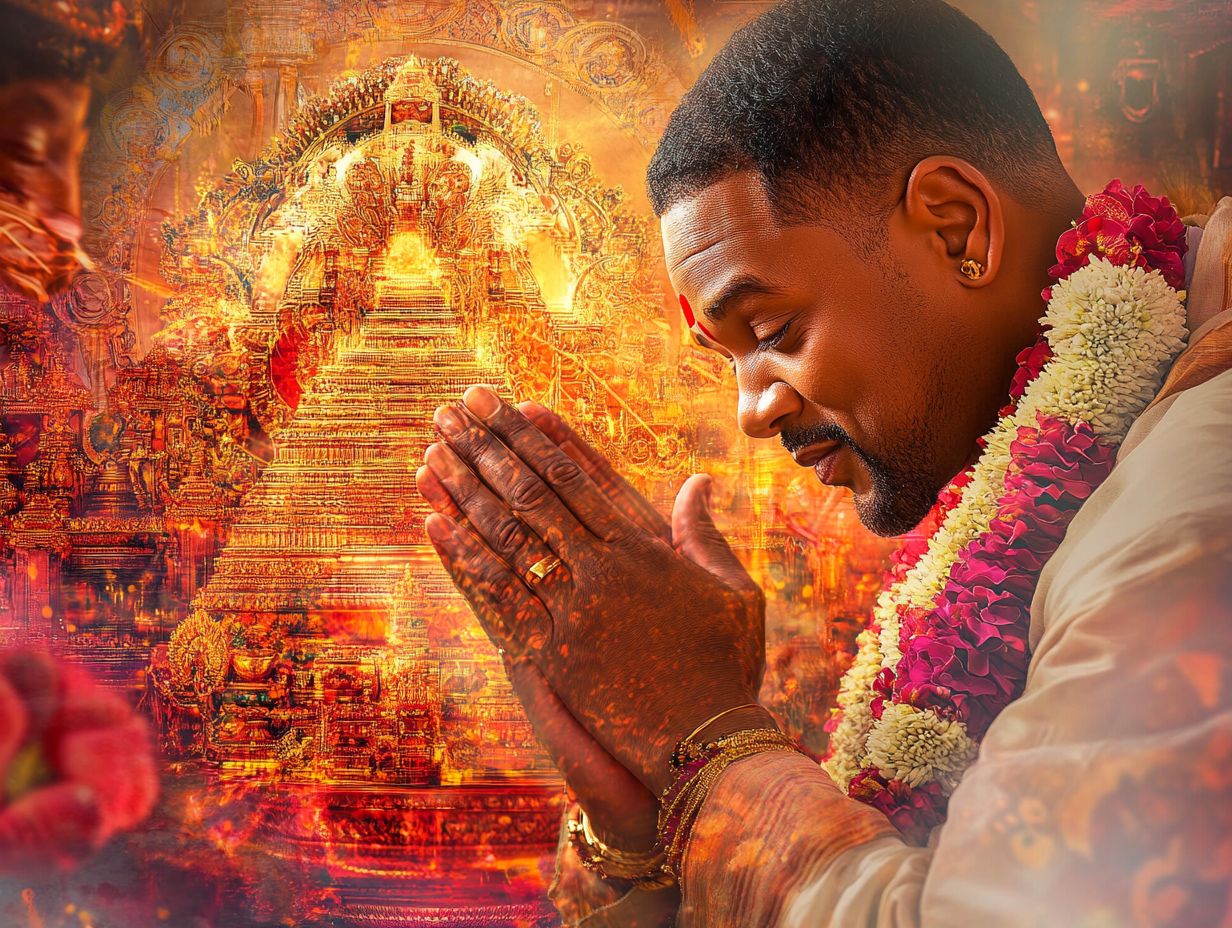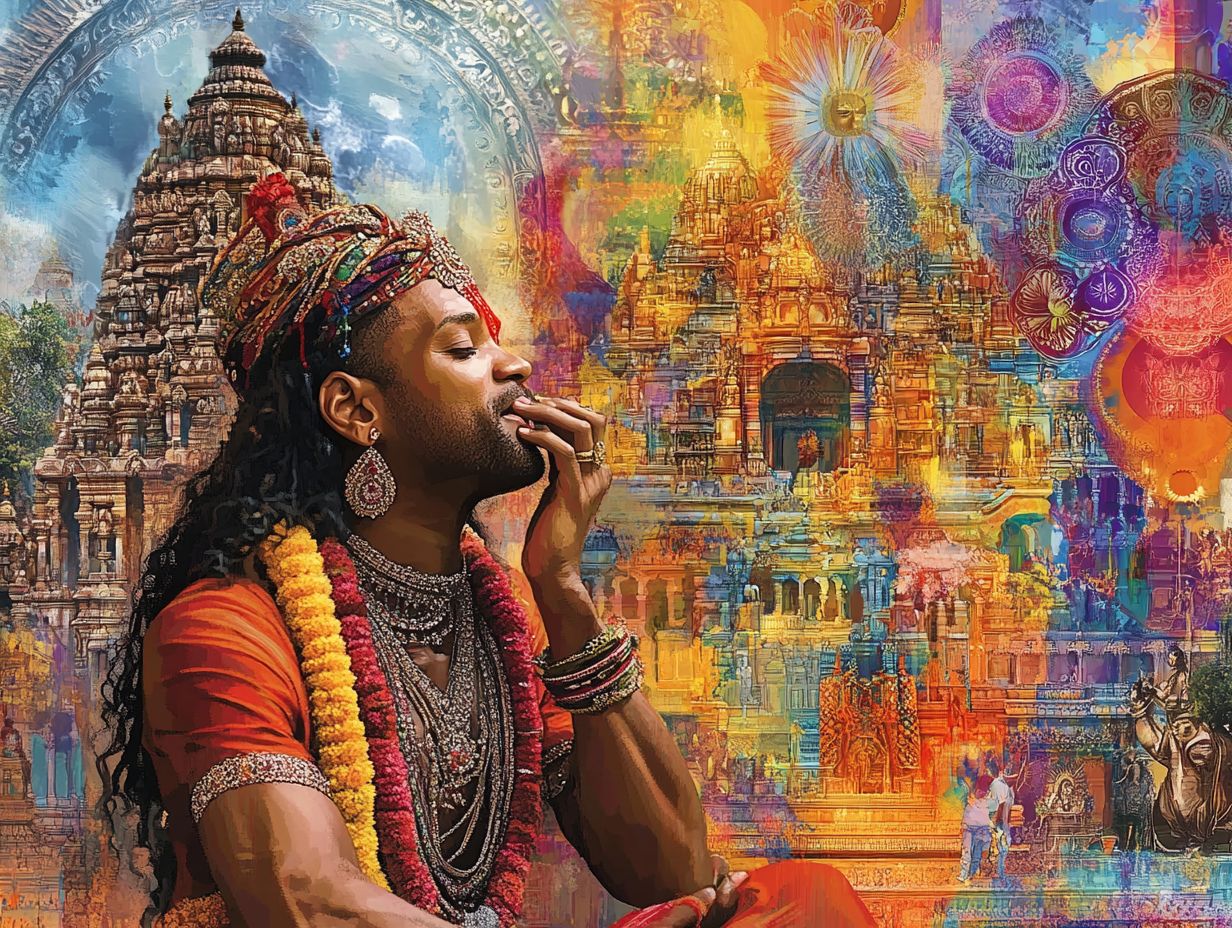Is Will Smith Hinduism?
Curious about Will Smith’s spiritual beliefs and his connection to Hinduism? This article delves into the multifaceted life of the iconic actor, examining his interest in Eastern philosophy, his ties to Indian culture, and his broader exploration of spirituality vs religion.
It unpacks the core tenets of Hinduism, exploring concepts such as reincarnation, karma, and dharma, while also discussing the practices that accompany these beliefs, including meditation, yoga, and other traditional rituals.
Readers will discover how Smith’s upbringing, personal life, and diverse spiritual journey have shaped his views and identity, offering a deeper understanding of the influences, including cultural identity and global perspectives, that contribute to his remarkable persona.
Who Is Will Smith?

Will Smith stands as an iconic American actor, producer, and musician, celebrated for his substantial contributions to the film industry and his dynamic public persona. With a career that spans decades, Smith has skillfully embodied a wide array of characters in blockbuster films, demonstrating his versatility and influence in Hollywood. All while fostering a deep connection with his audience, from diverse backgrounds and multiculturalism.
His personal journey, shaped by the influences of his family background and upbringing, represents a distinctive blend of cultural identity and representation. As a prominent public figure, Smith adeptly navigates the intricacies of fame, including media scrutiny, and his diverse roles in Hollywood unveil an evolving narrative that resonates with a multicultural audience and addresses pressing contemporary social issues, including interfaith dialogue and religious tolerance.
What Is Hinduism?
Hinduism stands as one of the oldest religions in the world, distinguished by a rich tapestry of beliefs, philosophies, and spiritual practices that have gracefully evolved over millennia. As a complex belief system, it encompasses a diverse array of sects, rituals, and ethical values, all of which reflect the profound cultural heritage of South Asia and the enduring significance of religious symbols and traditions.
The religion s revered scriptures, including the Vedas, Upanishads, and Bhagavad Gita, illuminate its foundational principles, offering guidance to millions on their spiritual journeys. With its strong emphasis on personal beliefs and the exploration of various paths toward understanding the divine, Hinduism presents a unique and multifaceted perspective on spirituality, religious practices, and the essence of life.
What Are the Beliefs of Hinduism?
The beliefs inherent in Hinduism are both profound and diverse, showcasing the religion’s extensive philosophical foundation and spiritual depth, as well as its influence on cultural practices and personal beliefs.
Central to these beliefs are key concepts such as reincarnation, karma, and dharma, which significantly influence the moral teachings and ethical values embraced by its adherents. This intricate belief system underscores the cyclical nature of existence, or samsara, where actions in one’s current life impact future incarnations, thereby fostering a sense of accountability and promoting spiritual growth.
Furthermore, Hinduism encourages a profound exploration of personal beliefs and faith, inviting individuals to embark on their own unique spiritual journeys, fostering critical thinking and personal values.
1. Reincarnation
Reincarnation stands as a cornerstone of Hindu belief, asserting that the soul traverses a cyclical journey of birth, death, and rebirth until it achieves liberation, or moksha. This philosophy underscores the soul s continuous spiritual evolution, where each existence serves as a crucial opportunity for growth and enlightenment, shaped by the karma accrued in previous lives. This fundamental aspect of Hinduism provides a deeper understanding of personal beliefs and ethical values.
This profound understanding significantly influences individual lives, instilling a deep sense of accountability for one’s actions. Each decision resonates across lifetimes, prompting individuals to recognize the weight of their choices. The intricate dynamics of karma encourage compassionate behavior, nurturing personal development and a richer comprehension of one’s purpose, and promoting moral decision-making.
The repercussions of past actions reveal themselves through present challenges and successes, steering personal evolution toward higher states of consciousness. As individuals embark on their spiritual journeys, they gradually come to appreciate the interconnectedness of all beings, fostering empathy and aspiring to achieve harmony within both their inner selves and the broader world around them.
2. Karma
Karma, a fundamental principle in Hinduism, embodies the law of cause and effect, asserting that every action bears consequences that shape one’s future. This belief highlights the significance of moral decision-making in everyday life, encouraging individuals to adopt ethical behaviors that foster spiritual growth and promote harmony within the universe.
By acknowledging that every choice carries significance, individuals are inspired to cultivate virtues such as compassion, honesty, and accountability. This comprehension of karma not only enriches one s understanding of interpersonal relationships but also profoundly influences personal conduct, ethics, and morality.
As individuals contemplate their actions and the potential outcomes that may ensue, they often undergo transformative growth that resonates with their spiritual journeys. This heightened awareness paves the way for deeper insights, facilitating a more harmonious existence and generating a cycle of positive energy that uplifts both the individual and the wider community.
3. Dharma
Dharma in Hinduism embodies the moral obligations and duties that individuals are called to uphold throughout their lives, serving as a guiding principle for their actions and decisions in alignment with ethical values. This concept encourages adherents to live in harmony with their societal roles, thereby fostering balance and unity within their communities and personal lives, and promoting a holistic lifestyle.
It encompasses a broad spectrum of responsibilities, ranging from the duties of a parent and spouse to one’s position within the larger social framework. This illustrates the profound interconnectedness between personal conduct and societal wellbeing. By adhering to their dharma, individuals cultivate virtues such as truthfulness, compassion, and non-violence qualities deemed essential for ethical living and personal development.
This commitment shapes not only one s personal destiny but also enhances collective harmony; when all members of a society fulfill their dharma, the community flourishes as a whole, fostering acceptance and unity.
The fluid nature of dharma allows it to adapt to changing circumstances, ensuring that ethical values remain pertinent across generations. Ultimately, the practice of dharma instills a sense of accountability and reverence for the interconnectedness of all life, promoting a deeper awareness of one’s role in the community.
What Are the Practices of Hinduism?

The practices of Hinduism encompass a vast array of rituals, meditation techniques, and spiritual exercises, all meticulously designed to deepen one s connection with the divine and foster personal growth. These practices are integral to the cultural fabric and religious traditions of Hinduism, reflecting its profound spiritual heritage.
Integral to the Hindu way of life, these practices ranging from meditation to yoga promote mindfulness, enhance physical well-being, and facilitate spiritual enlightenment.
1. Meditation
Meditation holds a pivotal role in Hinduism, acting as a gateway to mental clarity, inner peace, and spiritual insight. This essential practice enables individuals to focus their minds and deepen their connection to spirituality, thereby facilitating personal growth, self-discovery, and critical thinking.
In the expansive realm of Hindu meditation, a variety of techniques such as Yoga Nidra, mantra chanting, and mindfulness meditation present distinct avenues for spiritual enhancement and personal growth. For example, Yoga Nidra, often described as ‘yogic sleep’, allows practitioners to achieve profound states of relaxation while maintaining awareness, promoting deep healing and rejuvenation. Conversely, mantra chanting elevates one’s consciousness; the rhythmic repetition of sacred sounds generates potent vibrations that resonate with spiritual energy. These techniques contribute to a holistic lifestyle and reinforce the interconnectedness of spiritual practices in Hinduism.
Through these diverse methodologies, individuals cultivate heightened awareness, emotional resilience, and a profound sense of unity with the universe, ultimately nurturing the soul s journey toward enlightenment.
2. Yoga
Yoga, deeply rooted in Hindu philosophy, serves as a comprehensive practice that intertwines physical postures, breath control, and meditative techniques to foster both physical wellness and spiritual growth. This holistic approach embodies the core principles of Hinduism, promoting a harmonious balance between body, mind, and spirit. It also underscores the importance of self-exploration and embracing a holistic lifestyle.
The myriad styles of yoga, including Hatha, Vinyasa, and Kundalini, present unique pathways to personal transformation. Hatha yoga emphasizes foundational postures aimed at building strength, while Vinyasa focuses on fluid movement, seamlessly connecting breath with motion to create a dynamic flow. In contrast, Kundalini seeks to awaken the spiritual energy residing within individuals through the use of chants, rituals, and breathwork, ultimately elevating consciousness. These styles offer diverse approaches to achieving physical well-being and spiritual enlightenment, reflecting the rich tradition of yoga within Hinduism.
These diverse practices not only enhance physical health by improving flexibility and strength but also deepen spiritual awareness, allowing practitioners to embark on a journey of self-exploration. Engaging with these various styles can lead to profound insights, nurturing a deeper connection to one’s spirituality and the broader world.
Is Will Smith a Hindu?
Although Will Smith has explored and expressed admiration for various spiritual practices and religions, including Hinduism, he has not publicly identified as a Hindu. His spiritual inquiry and interest in Eastern philosophies highlight a broader trend of celebrity spirituality and the impact of global culture on personal beliefs. This journey reflects the diversity and multiculturalism present in his personal and professional life.
The inquiry into whether Will Smith identifies as a Hindu prompts a thoughtful examination of the actor’s personal beliefs and his engagement with Eastern philosophies. Although he has not formally declared himself a Hindu, Smith has conveyed a deep admiration for various elements of Hinduism and its teachings, reflecting a genuine openness to a spectrum of spiritual practices.
1. His Interest in Eastern Philosophy
Will Smith’s fascination with Eastern philosophy exemplifies his pursuit of deeper understanding and personal growth as he delves into spiritual concepts that resonate profoundly with him. This exploration reflects his open-mindedness and his readiness to engage with a variety of belief systems.
For instance, his adoption of mindfulness practices, including meditation and yoga, highlights a genuine commitment to self-reflection and mental clarity principles often emphasized within Eastern traditions. His public discussions regarding the importance of concepts like karma and the interconnectedness of all beings reveal a nuanced comprehension of how personal choices reverberate throughout the world.
By weaving these philosophies into the fabric of his life, Smith not only enriches his own journey but also leaves a significant impact on those around him. Such insights contribute not only to his personal development but also enhance his public image as a thoughtful and introspective figure within the Hollywood landscape.
2. His Connection to India
Will Smith’s connection to India highlights his profound appreciation for cultural exchange and the spiritual depth inherent in South Asian traditions. His experiences in India have significantly shaped his views on spirituality and personal development, allowing him to cultivate a richer understanding of diverse cultures.
During his visit, he actively engaged with local communities, immersing himself in the vibrant festivals and traditional art forms that embody the spirit of Indian heritage. One particularly notable interaction involved spiritual leaders who imparted profound insights on mindfulness and meditation practices that Smith found to be transformative. These encounters not only deepened his understanding of spirituality but also underscored the significance of cross-cultural connections in fostering empathy and compassion.
As he traversed various regions, from the bustling streets of Mumbai to the tranquil landscapes of Rishikesh, the actor emerged with a renewed appreciation for the diverse philosophies that shape life in India. This journey has undeniably influenced his path of personal growth and introspection.
3. His Statements on Religion

Will Smith’s reflections on religion reveal a nuanced comprehension of faith and spirituality, frequently underscoring the significance of tolerance and open-mindedness. In his interviews and public engagements, he adeptly navigates the intricacies of religious identity, promoting dialogues about diverse belief systems.
By advocating for a broader acceptance of varying perspectives, Smith conveys a message that transcends mere acknowledgment; he champions a profound sense of interconnectedness among different faiths. This approach aligns seamlessly with his public persona, which is marked by positivity and an earnest desire to inspire others.
Often, Smith underscores the importance of personal experiences in shaping one s beliefs, suggesting that spirituality is a deeply individual journey, rich with insights gleaned from life s challenges. This acknowledgment of personal growth and openness in discussions about faith adds significant depth to his portrayal as an approachable figure who cultivates understanding and compassion across differing worldviews.
What Religion Does Will Smith Follow?
Will Smith’s religious background is predominantly anchored in Christianity, molded by his upbringing in a devout Christian household.
Yet, his journey through personal beliefs and spiritual exploration reveals a complex and nuanced relationship with religion, as he adeptly navigates a variety of influences that contribute to the formation of his spiritual identity.
1. His Upbringing in a Christian Household
Growing up in a Christian household, Will Smith was deeply influenced by the tenets of Christianity, which significantly shaped his early values and beliefs. His family background instilled in him a profound sense of faith and community, which in turn informed his perspectives on morality and ethics.
These teachings encouraged him to embody qualities such as kindness, resilience, and a robust work ethic. As Smith navigated the complexities of personal and professional challenges, these foundational ideals acted as a moral compass, guiding his decisions and shaping his interactions with others.
Even amidst the heights of fame and success, he remained connected to his roots, frequently reflecting on the invaluable lessons imparted during his upbringing. This seamless integration of faith and values is evident in his philanthropic endeavors and unwavering commitment to family, where he consistently emphasizes the significance of integrity and love in every facet of life.
2. His Beliefs on Spirituality
Will Smith’s beliefs on spirituality embody a continuous journey of exploration and self-discovery, as he endeavors to grasp the deeper meanings of life that transcend traditional religious frameworks. His insights frequently delve into moral dilemmas and underscore the importance of personal growth in navigating the complexities of existence.
Through a myriad of experiences, including his ascent to fame and the accompanying challenges, he has cultivated a distinctive perspective that highlights the necessity of posing profound questions about one’s purpose and values. Smith advocates for confronting inner conflicts and embracing vulnerability, viewing these moments as crucial for authentic growth.
In his discussions, he often reflects on the interplay between spirituality and daily choices, emphasizing how this relationship steers him toward a more ethical life that aligns with his core principles. Ultimately, his narrative stands as a testament to the transformative power of self-awareness and spiritual exploration in the pursuit of a fulfilling existence.
3. His Connection to Scientology
Will Smith’s connection to Scientology has ignited both fascination and controversy, as the actor’s beliefs and involvement with the organization have become subjects of intense public scrutiny. His association with Scientology prompts inquiries into his spiritual identity and the influence of celebrity on personal convictions.
The actor’s engagement with the Church of Scientology not only fuels speculation about his personal beliefs but also highlights the ways in which such affiliations can shape public perceptions of a prominent figure. Critics frequently point to the church’s secretive nature and contentious history, suggesting that this relationship may obscure the truth behind Smith’s carefully crafted public persona.
The interplay between his film roles and his advocacy for the Church elicits mixed reactions, as fans navigate the complexities of distinguishing an artist’s work from their personal beliefs. Within this landscape, the intricacies of Smith’s spiritual journey emerge as a focal point for understanding not only his artistic choices but also the broader implications of celebrity endorsements within controversial organizations.
Frequently Asked Questions
Is Will Smith Hinduism?

No, Will Smith is not Hinduism. He does not follow the Hindu religion or practice Hinduism in any way.
Does Will Smith believe in Hinduism?
No, Will Smith does not believe in Hinduism. He follows the teachings of Christianity and is not a Hindu.
Has Will Smith ever talked about Hinduism?
Yes, Will Smith has mentioned Hinduism in interviews and has expressed his interest in learning more about different religions. However, he does not follow Hinduism himself.
Is Will Smith converting to Hinduism?
No, there is no evidence to suggest that Will Smith is converting to Hinduism. He has not publicly expressed any desire to convert to the religion.
Is Will Smith familiar with Hinduism?
It is possible that Will Smith has some knowledge about Hinduism, as he has traveled to India and has shown interest in learning about different religions. However, he does not practice Hinduism himself.
Are there any connections between Will Smith and Hinduism?
There are no known connections between Will Smith and Hinduism. He does not have any family members who are Hindu and he has not mentioned any personal connections to the religion.
